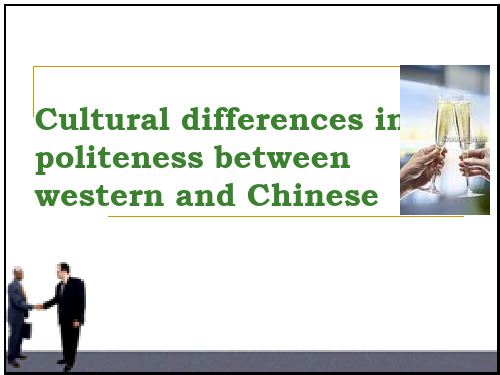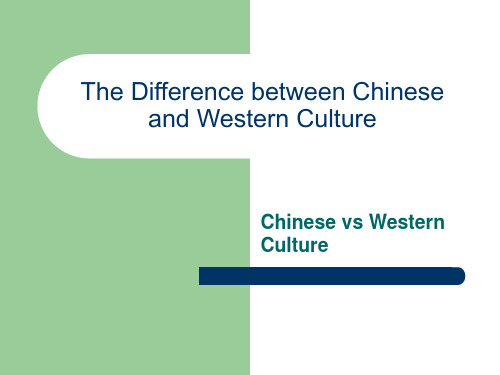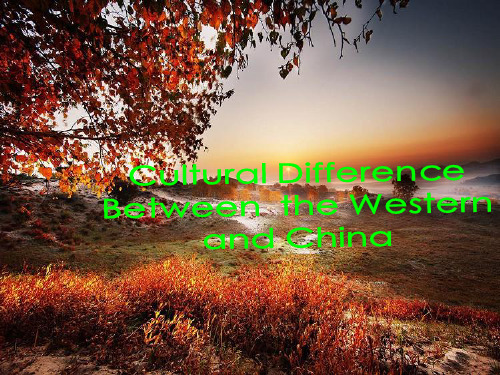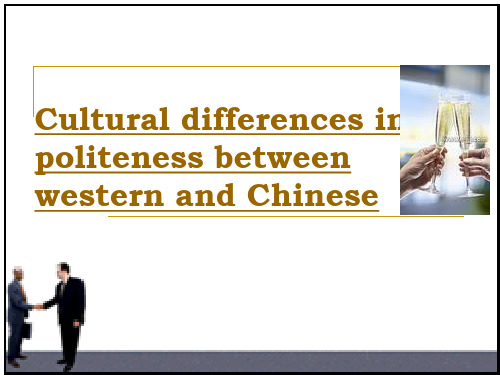初三英语 中西文化差异ppt模版课件
合集下载
中西方文化差异PPT

before long…”
Parting in China
Good Bye
Bye
throws the embroidered ball
In China
Bride and bridegroom(新娘和新郎) The date of birth and the eight characters of a horoscope(生辰八字) Red clothes(the red color represents lucky) Bridal sedan chair(花轿)
Knives
and forks Chopsticks
Conclusion
China is a country with one of the longest
histories in the world.
We have Profound(深厚的) Traditional Cultures ,especially comparing with the Western Countries.
The Different Cultures Between China And Western Countries
Contents
1.Greeting and Parting 2.Marriage customs 3.Eating customs
Greeting in China
When people meet acquaintances (熟人) or friends, we always say : Have you eaten yet?
“Well, it’s been nice to see you again. I do enjoy our talk and the lovely dinner, but I must be going soon”.
Parting in China
Good Bye
Bye
throws the embroidered ball
In China
Bride and bridegroom(新娘和新郎) The date of birth and the eight characters of a horoscope(生辰八字) Red clothes(the red color represents lucky) Bridal sedan chair(花轿)
Knives
and forks Chopsticks
Conclusion
China is a country with one of the longest
histories in the world.
We have Profound(深厚的) Traditional Cultures ,especially comparing with the Western Countries.
The Different Cultures Between China And Western Countries
Contents
1.Greeting and Parting 2.Marriage customs 3.Eating customs
Greeting in China
When people meet acquaintances (熟人) or friends, we always say : Have you eaten yet?
“Well, it’s been nice to see you again. I do enjoy our talk and the lovely dinner, but I must be going soon”.
中西方文化差异英文版-PPT文档资料17页

Cultural differences in politeness between western and Chinese
1.Greeting and Parting
• In China, When people meet acquaintances or friends, we always say ,“Have you eaten yet?” What are you going to do?”
East&West
when we talk to the westerns, we must avoid asking some questions like this:
“How old are you?” “Are you married?” “How many children do
4. Thanks and Responses
In China,“Thank you” is not frequently used between intimate friends and family members because it may imply a certain distance between the addresser and the addressee.
• In English, people often employ the following expressions to greet each other “Good morning/evening/afternoon. “Fine day, isn’t it? ”How is everything going?”,etc.
Different cultural factors may result in cultural differences.
1.Greeting and Parting
• In China, When people meet acquaintances or friends, we always say ,“Have you eaten yet?” What are you going to do?”
East&West
when we talk to the westerns, we must avoid asking some questions like this:
“How old are you?” “Are you married?” “How many children do
4. Thanks and Responses
In China,“Thank you” is not frequently used between intimate friends and family members because it may imply a certain distance between the addresser and the addressee.
• In English, people often employ the following expressions to greet each other “Good morning/evening/afternoon. “Fine day, isn’t it? ”How is everything going?”,etc.
Different cultural factors may result in cultural differences.
中西文化差异(英文版)ppt

-
Differences in food
-
Chinese food and western food
In China, we prefer noodles, rice , dumpling as the main course.
We like cooking a lot of delicious dishes, then we set up the tables, put the dishes on the tables, sit together, and taste the dishes together, we don’t eat with individual plates, when we eating ,we like chatting and laughing, we think it’s warm and happy to eat this way;
• An western hostess is likely to say,” Oh, I am so glad that you liked it. I cook it especially for you.”
-
-
Differences in thinking -
-
-
-
-
-
THANKS
-
The standard of evaluating
-
Differences in living style
Chinese prefer getting up early and go to bed early too. We
usually go home early and cook meals, then we eat and watch TV, then we go to bed. We often work during the holidays , children often go to different spare schools to study. We like save money and when we have enough money, we then go and buy what we want, in my opinion, Chinese are so tired and busy;
Differences in food
-
Chinese food and western food
In China, we prefer noodles, rice , dumpling as the main course.
We like cooking a lot of delicious dishes, then we set up the tables, put the dishes on the tables, sit together, and taste the dishes together, we don’t eat with individual plates, when we eating ,we like chatting and laughing, we think it’s warm and happy to eat this way;
• An western hostess is likely to say,” Oh, I am so glad that you liked it. I cook it especially for you.”
-
-
Differences in thinking -
-
-
-
-
-
THANKS
-
The standard of evaluating
-
Differences in living style
Chinese prefer getting up early and go to bed early too. We
usually go home early and cook meals, then we eat and watch TV, then we go to bed. We often work during the holidays , children often go to different spare schools to study. We like save money and when we have enough money, we then go and buy what we want, in my opinion, Chinese are so tired and busy;
中西文化差异英文PPT

Western:
1. Western culture is based on individualism rather than on mass (collectivism). For instance, in the US, you always talk about individual rights, instead of placing the whole society above your own self. This is clearly different in China where a country, society or family are placed above your own self.
Chinese:
4. To resolve people and people's relationship, chinese uses ethics and tolerance (中恕之道)
Western:
5. West uses 'god' and religion to resolve human and spiritualism relationship. In case of problems with your own self, you just pray to god.
Chinese:
6. A focus on balance and mean. By 'mean', it means 'middle way'. You don't go into extremism. Peace is always honoured.
Chinese:
7. Pay homage to heaven and earth, as well as bearing a remembrance to the homeland. (敬仰天地,思乡怀土) This was accorded to the fact that chinese had been a farming civilization and therefore will be more prone to remember their land.
中西文化差异 cultural differences PPT

Etiquette culture (礼仪文化) --- Addressing(称呼)
2、Addressing the superior or elders
(称呼上级或者长辈)
In China: “title +surname”(头衔+姓)
Westerner:calling directly, namely, even first names(直呼姓名)
中西文化差异 cultural differences
Content (目录)
1、Food and tableware culture (餐桌文化) 2、Etiquette culture (礼仪文化) 3、Number and color differences (数字与
颜色不同) 4、Wedding differences(婚礼文化) 5、Education differences (教育)
White(白色)
In China
Death (死亡) Failure (失败) Decay (腐朽) Surrender (投降)
In western country
Elegance(高雅) Purity(纯洁) Integrity (正直) Honesty (诚实)
Lucky numbers(幸运数字)
大家学习辛苦了,还是要坚持
继续保持安静
Chinese tableware(中国餐具)
chopsticks(筷子) spoon(汤勺) bowl(碗)
Western tableware(西方餐具)
knife(刀) fork(餐叉) glass(酒杯) napkin(餐巾纸)
1、Greeting (打招呼) 2、Addressing (称呼) 3、Compliments and Response (称赞与回答) 4、Asking Personal Affairs (询问私人问题)
中西文化差异(英语)ppt

However, in the western countries, the above questions are just questions, not greeting at all. They may think you’re inviting them to eat dinner if you ask about their meals. Usually, they’ll just give each other a smile or greet with a “Hi.”.
Chinese culture is based on masses (collectivism). People placed country and family above your own self.
Conception II
• Western culture is adventurous and exploration based. Westerners like to discover new things, invention and expand outwards. For instance, bungee jumping is considered adventurous and common in western am afraid I must be off, I have to …”
2.“Well, it’s been nice to see you again. I do enjoy
our
talk and the lovely dinner, but I must be going
Greeting is the first step to form culture
In China, if we meet a friend in the street, we are used to say: “Hi, have you had your meal?” or “Where are you going?”.
中西方文化差异英文版.ppt

• 1.“I am afraid I must be off, I have to …” • 2.“Well, it’s been nice to see you again. I do enjoy our
talk and the lovely dinner, but I must be going soon”. • 3.“Thank you very much for asking me over. I hope
In a formal setting, westerners address men as "Mister" (Mr), married women as "Misses" ("Mrs."), and unmarried women as "Miss" ( "Ms."). These days many women prefer to be addressed using the abbreviations "Ms." , pronounced "miz".
In west, Although they
are different in age antly, namely, their names, even first names .They demonstrate the sense of intimacy and the conception of” Everyone is created equal”
• In English, people often employ the following expressions to greet each other “Good morning/evening/afternoon. “Fine day, isn’t it? ”How is everything going?”,etc.
talk and the lovely dinner, but I must be going soon”. • 3.“Thank you very much for asking me over. I hope
In a formal setting, westerners address men as "Mister" (Mr), married women as "Misses" ("Mrs."), and unmarried women as "Miss" ( "Ms."). These days many women prefer to be addressed using the abbreviations "Ms." , pronounced "miz".
In west, Although they
are different in age antly, namely, their names, even first names .They demonstrate the sense of intimacy and the conception of” Everyone is created equal”
• In English, people often employ the following expressions to greet each other “Good morning/evening/afternoon. “Fine day, isn’t it? ”How is everything going?”,etc.
中西方文化差异英文版ppt课件

Our topic:
The culture difference between china and western countries .
Value of education
China
Western countries
Care about the reputation in educating in the child.
The diet concept
China
Western countries
Chinese food pay more attention to color, aroma, taste, and shape rather than nutrition.
Western food is a rational concept. They think the food’s nutrition is the most important.
Western countries
Emphasize mechanical (机械的)memorizing .
Emphasize the child’s “power of understanding”.
If the book is read hundreds of times , its meaning is shown naturally .
selected materials show great eating, whole chickens and
randomness
other "hard food."
The diet object
China
Western countries
The diet ways
China
The culture difference between china and western countries .
Value of education
China
Western countries
Care about the reputation in educating in the child.
The diet concept
China
Western countries
Chinese food pay more attention to color, aroma, taste, and shape rather than nutrition.
Western food is a rational concept. They think the food’s nutrition is the most important.
Western countries
Emphasize mechanical (机械的)memorizing .
Emphasize the child’s “power of understanding”.
If the book is read hundreds of times , its meaning is shown naturally .
selected materials show great eating, whole chickens and
randomness
other "hard food."
The diet object
China
Western countries
The diet ways
China
- 1、下载文档前请自行甄别文档内容的完整性,平台不提供额外的编辑、内容补充、找答案等附加服务。
- 2、"仅部分预览"的文档,不可在线预览部分如存在完整性等问题,可反馈申请退款(可完整预览的文档不适用该条件!)。
- 3、如文档侵犯您的权益,请联系客服反馈,我们会尽快为您处理(人工客服工作时间:9:00-18:30)。
• The English are conservative • Americans are individualistic • The French are romantic
National culture Personal traits of people from that nation
“Way of Life” definition of culture
Assumes that people with similar life experiences share VALUES. They see the world in similar ways. Members of important groups share MEANINGS. They can understand one another more easily than they can understand people from other groups. Group membership is often more important than national culture.
ICC - Intercultural communication competence
Knowledge of social groups in your own country and other countries Attitude of openness about other cultures and people Ability to gain new knowledge and to act on that knowledge Knowledge of processes and ability to use that knowledge How to communicate – not just how to speak the target language
Are Americans more individualistic than Chinese?
The conventional opinion is yes, they are. There is some truth to it, but it is an oversimplification. This idea alone is not a useful guide to predicting the preferences or behavior of Americans. Chinese educational culture is much more individualistic than American educational culture.
What do I know about the NBA?
Nothing at all I am female and I am old The NBA is American and I am an American It is an experience shared by male members of the international youth culture I am not a member of that culture So, don’t assume that national culture is the only or best level of analysis
• American teachers collaborate more. • Students do more group work.
If you use ‘American individualism’ to predict what Americans prefer, you will make many mistakes
People often ask me questions about Americans They assume all Americans are alike They want me to give them a generalization Generalizations about national cultures cause many misunderstandings in communication
Do I know how to use chopsticks?
Of course, I do. Why do people keep asking me that question? Because Chinese use chopsticks and Americans use knives and forks, and I am an American They assume that I am different from them in every way because I am a waiguo ren Look for similarities, not just differences When you meet someone for the first time, you look for what you have in common with that person.
• • • • Meeting, greeting, starting a conversation Expressing agreement and disagreement Asking for information Working with others
Then, how do we teach culture? Three approaches aretional competition Americans excel at team sports while Chinese excel at individual sports. Americans are constantly forming groups and joining groups to meet a variety of personal and professional goals. Typically, Americans participate in groups very differently from the way Chinese people do.
Big “C” Culture
• Important people, works, events • Mark Twain, Bill Gates, “I have a dream” speech, War of Independence, Civil War
Little “c” culture
What do I know about teaching?
A lot; it is my love, my craft, my life I share many experiences with other teachers It doesn’t matter whether they are Americans or Chinese We can communicate about teaching, learning, schools, students, etc. We share an academic or educational culture Differences in national culture are not necessarily significant barriers to communication
Pay attention to processes rather than traits
How do people carry on a friendship? How do they teach; how do they learn? How do they show respect? How do they express disagreement? How do they apologize? How do they handle relationships with people of higher or lower status than themselves? How do they participate in work groups?
Do all Americans sleep late?
A Chinese friend invited me to go to a park to do morning exercises BUT – all along the way she complained about the traffic. I asked – Why do you do it if it is so unpleasant? Her answer – You are an American, so I didn’t think you would want to go as early as I usually go. I am an early-riser. National culture is not a good predictor of most personal habits.
How do Americans celebrate Christmas?
In many different ways, some not at all
• Ethnic cultures – Italian/Swedish/German/Hispanic • Religious cultures – Christian/Jewish/secular • Regional cultures –south/north, east coast/west coast
National culture Personal traits of people from that nation
“Way of Life” definition of culture
Assumes that people with similar life experiences share VALUES. They see the world in similar ways. Members of important groups share MEANINGS. They can understand one another more easily than they can understand people from other groups. Group membership is often more important than national culture.
ICC - Intercultural communication competence
Knowledge of social groups in your own country and other countries Attitude of openness about other cultures and people Ability to gain new knowledge and to act on that knowledge Knowledge of processes and ability to use that knowledge How to communicate – not just how to speak the target language
Are Americans more individualistic than Chinese?
The conventional opinion is yes, they are. There is some truth to it, but it is an oversimplification. This idea alone is not a useful guide to predicting the preferences or behavior of Americans. Chinese educational culture is much more individualistic than American educational culture.
What do I know about the NBA?
Nothing at all I am female and I am old The NBA is American and I am an American It is an experience shared by male members of the international youth culture I am not a member of that culture So, don’t assume that national culture is the only or best level of analysis
• American teachers collaborate more. • Students do more group work.
If you use ‘American individualism’ to predict what Americans prefer, you will make many mistakes
People often ask me questions about Americans They assume all Americans are alike They want me to give them a generalization Generalizations about national cultures cause many misunderstandings in communication
Do I know how to use chopsticks?
Of course, I do. Why do people keep asking me that question? Because Chinese use chopsticks and Americans use knives and forks, and I am an American They assume that I am different from them in every way because I am a waiguo ren Look for similarities, not just differences When you meet someone for the first time, you look for what you have in common with that person.
• • • • Meeting, greeting, starting a conversation Expressing agreement and disagreement Asking for information Working with others
Then, how do we teach culture? Three approaches aretional competition Americans excel at team sports while Chinese excel at individual sports. Americans are constantly forming groups and joining groups to meet a variety of personal and professional goals. Typically, Americans participate in groups very differently from the way Chinese people do.
Big “C” Culture
• Important people, works, events • Mark Twain, Bill Gates, “I have a dream” speech, War of Independence, Civil War
Little “c” culture
What do I know about teaching?
A lot; it is my love, my craft, my life I share many experiences with other teachers It doesn’t matter whether they are Americans or Chinese We can communicate about teaching, learning, schools, students, etc. We share an academic or educational culture Differences in national culture are not necessarily significant barriers to communication
Pay attention to processes rather than traits
How do people carry on a friendship? How do they teach; how do they learn? How do they show respect? How do they express disagreement? How do they apologize? How do they handle relationships with people of higher or lower status than themselves? How do they participate in work groups?
Do all Americans sleep late?
A Chinese friend invited me to go to a park to do morning exercises BUT – all along the way she complained about the traffic. I asked – Why do you do it if it is so unpleasant? Her answer – You are an American, so I didn’t think you would want to go as early as I usually go. I am an early-riser. National culture is not a good predictor of most personal habits.
How do Americans celebrate Christmas?
In many different ways, some not at all
• Ethnic cultures – Italian/Swedish/German/Hispanic • Religious cultures – Christian/Jewish/secular • Regional cultures –south/north, east coast/west coast
